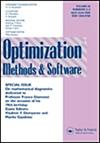无约束优化的全局收敛块坐标技术
IF 1.4
3区 数学
Q3 COMPUTER SCIENCE, SOFTWARE ENGINEERING
引用次数: 142
摘要
针对连续可微函数的无约束极小化问题,我们定义了一类新的全局收敛的块坐标技术。更具体地说,我们首先描述了基于对变量向量的块组件执行的基本操作的互连的分解算法的概念模型。然后,我们通过适当的线搜索或组件子空间的全局最小化来描述基本操作。利用这些模型,我们建立了关于非线性高斯-塞德尔方法的收敛性的新结果,并证明了这种具有两块分解的方法即使在没有凸性或唯一性假设的情况下也是向平稳点全局收敛的。在非凸目标函数和任意分解的一般情况下,我们定义了新的全局收敛的基于线搜索的方案,该方案也可能包含对某些分量的部分全局最优。计算方面没有…本文章由计算机程序翻译,如有差异,请以英文原文为准。
Globally convergent block-coordinate techniques for unconstrained optimization
In this paper we define new classes of globally convergent block-coordinate techniques for the unconstrained minimization of a continuously differentiable function. More specifically, we first describe conceptual models of decomposition algorithms based on the interconnection of elementary operations performed on the block components of the variable vector. Then we characterize the elementary operations defined through a suitable line search or the global minimization in a component subspace. Using these models, we establish new results on the convergence of the nonlinear Gauss–Seidel method and we prove that this method with a two-block decomposition is globally convergent towards stationary points, even in the absence of convexity or uniqueness assumptions. In the general case of nonconvex objective function and arbitrary decomposition we define new globally convergent line-search-based schemes that may also include partial global inimizations with respect to some component. Computational aspects are di...
求助全文
通过发布文献求助,成功后即可免费获取论文全文。
去求助
来源期刊

Optimization Methods & Software
工程技术-计算机:软件工程
CiteScore
4.50
自引率
0.00%
发文量
40
审稿时长
7 months
期刊介绍:
Optimization Methods and Software
publishes refereed papers on the latest developments in the theory and realization of optimization methods, with particular emphasis on the interface between software development and algorithm design.
Topics include:
Theory, implementation and performance evaluation of algorithms and computer codes for linear, nonlinear, discrete, stochastic optimization and optimal control. This includes in particular conic, semi-definite, mixed integer, network, non-smooth, multi-objective and global optimization by deterministic or nondeterministic algorithms.
Algorithms and software for complementarity, variational inequalities and equilibrium problems, and also for solving inverse problems, systems of nonlinear equations and the numerical study of parameter dependent operators.
Various aspects of efficient and user-friendly implementations: e.g. automatic differentiation, massively parallel optimization, distributed computing, on-line algorithms, error sensitivity and validity analysis, problem scaling, stopping criteria and symbolic numeric interfaces.
Theoretical studies with clear potential for applications and successful applications of specially adapted optimization methods and software to fields like engineering, machine learning, data mining, economics, finance, biology, or medicine. These submissions should not consist solely of the straightforward use of standard optimization techniques.
 求助内容:
求助内容: 应助结果提醒方式:
应助结果提醒方式:


